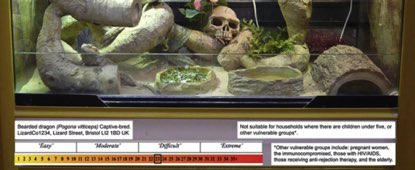
A scientific report published in the new issue of the Journal of Veterinary Behaviour calls for a 'pet-labelling scheme' to enable informed decision-making by consumers about the types of animals they keep. The Brighton-based Animal Protection Agency supports the proposed scheme, which they say is much-needed to ensure people don't acquire difficult or demanding pets.
Authors of the report entitled, 'Exotic pet suitability: understanding some problems and using a labeling system to aid animal welfare, environment and consumer protection', conclude that the more scientists learn about the needs of exotic animals, the more they appreciate their complexity and how generally unsuited they are to life as pets. Also, the time, money and expertise in keeping, particularly exotic, animals is commonly underestimated.
In addition to many species being unable to adapt to captivity, the report highlights low quality care information given by animal dealers and hobbyists as a cause of animal suffering and premature mortality, for instance, at least 75% of reptiles die within their first year in the home. Many animals are also dumped or surrendered to rescue centres by owners who find they are simply unable to cope.
The labelling scheme would require sellers to indicate how challenging animals are to keep by categorising them as either 'easy', 'moderate', 'difficult' or 'extreme' based on independent scientific information. Also included in the labelling would be important public health notices, as many exotic animals carry germs that are transmissible to people.

Example of a proposed pet animal labelling scheme within a pet store. The "lizard breeding company" cited is intended to be a fictitious name for illustrative purposes only.
Says lead author, Clifford Warwick:
“Sensible people and responsible industries accept that product labelling - whether food, drugs, tobacco or white goods - require clear, essential independent information to facilitate informed consent by consumers. This is even more important when the 'product' itself is a living, sentient, animal.”
Says Elaine Toland, Director of the Animal Protection Agency:
“It may seem distasteful to call for labels for living, feeling animals but the problem is that they are already priced-up, packaged, marketed and often mis-labelled as ‘easy to keep' or ‘suitable for beginners'. This innovative scheme, based on sound, scientific information by an international group of experts, is a straightforward way of addressing irresponsible trade practices and protecting animals as well as consumers.”
A key finding of the report is that there are currently at least 13,000 animal species in trade and private ownership, which places enormous burdens on enforcement authorities and rescue centres. The report authors also support the introduction of Positive Lists, which limit the types of species that can be legally kept and sold as pets to those for which sound, scientific evidence exists to show they are straightforward to keep in the home and do not harm people or the environment.